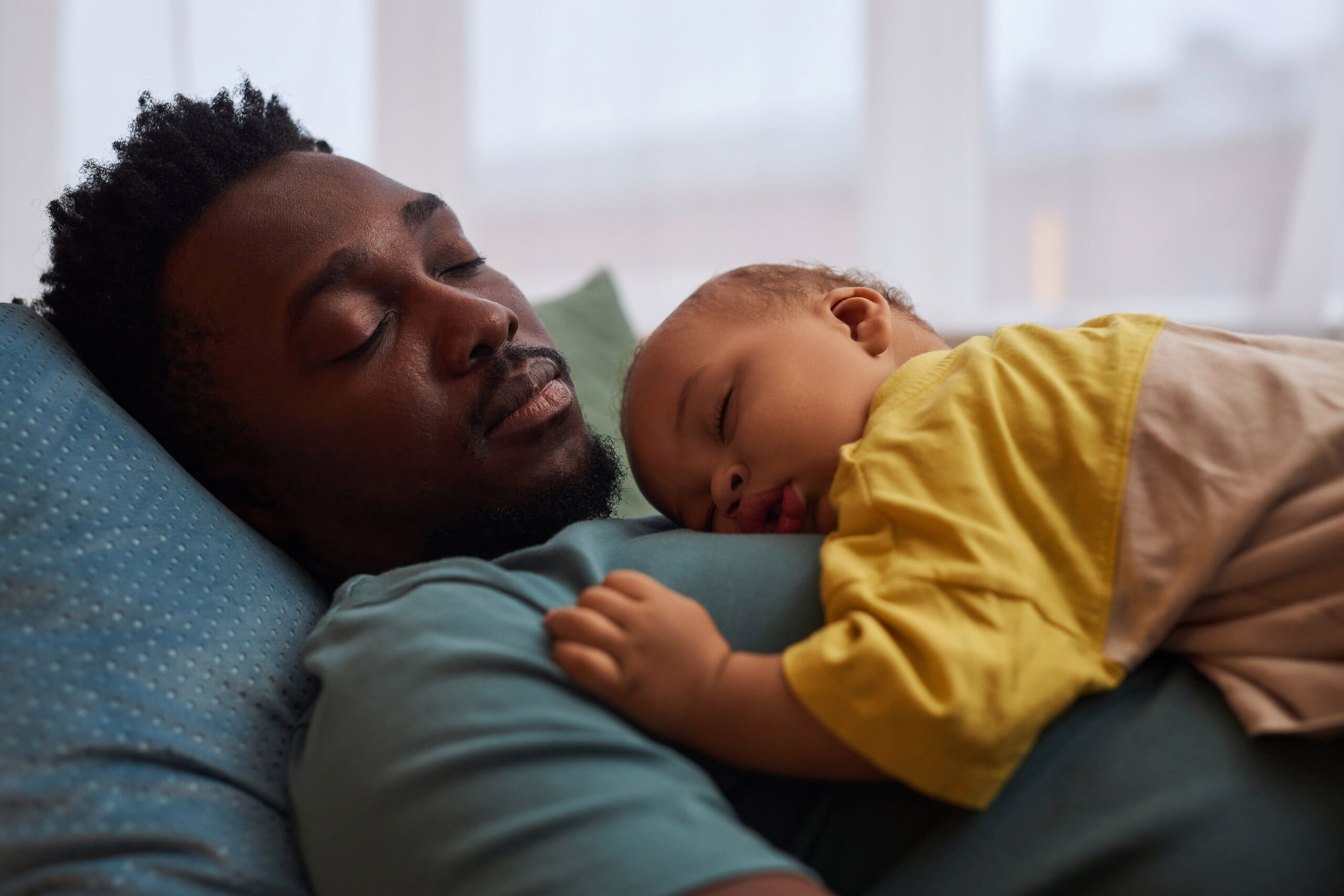Getting ready to welcome a newborn into your life in the not-too-distant future? Already dreading the inevitable sleep deprivation and consistent sleepless nights that’re going to come with it?
No one would argue that there’s something truly special about bringing your child home for the first time. But as any new parent will tell you, getting your baby to sleep steadily throughout the night for the first few months is next to impossible.
The unfortunate reality is that sleep deprivation for new parents is unavoidable – however, that doesn’t mean you can’t employ a variety of handy tips and tricks to make the constant waking and late-night diaper changes as painless as possible.
From setting up a flexible sleep routine to advice on how to get to sleep once you’ve been woken up, here are our expert insights for how to get to sleep as a new parent!

How much sleep do new parents get?
Given that waking up regularly during the night is a given while in the first few months of parenthood, you’re probably wondering just how many hours you’re going to be able to get as a new parent.
Well, as you might expect, getting a full 7-9 hours of uninterrupted rest simply isn’t going to happen, but there’s also no real average of how much sleep new parents get. The truth is that it will vary from family to family based on how often your baby wakes up and how you and your partner choose to handle late-night baby care duties.
Fortunately, as you’ll see below, there are many ways to make sure the sleep you are getting is as restful and stress-free as possible.
Tips for how to get to sleep as a new parent
As a new parent, you’ll find out pretty quickly that a baby’s sleep pattern is utterly unpredictable. A nap could last anywhere between 30 minutes and three hours, which makes practising normal sleep hygiene routines pretty much impossible.
However, with that being said, here are our expert’s top recommendations for dealing with sleep deprivation as a new parent:
1. Set up a regular sleep routine
Ok, while we’ve just noted how difficult it’s going to be to maintain your current bedtime routine, that doesn’t mean you should abandon it entirely. Instead, you should look to modify how you currently sleep to accommodate the challenges of raising a newborn.
So, before your baby is due, sit down with your partner and plan out the earliest you want to go to bed, how you want to split wake-up duties (which we’ll touch on more below), and when one of you might need to handle more of these responsibilities than the other.
On top of this, you should also establish a simple and easily memorable routine to follow each time your baby wakes. Consistency is going to be key for helping your baby get back to sleep, so try to keep swaddling, rocking, feeding, etc., in the same order each time.
2. Aim to match your baby’s sleep cycle
It might not seem like it with their constant waking, gurgling, and crying, but a newborn baby can sleep up to 17 hours a day! The difference here though is that babies tend to wake up at the end of each sleep cycle, rather than moving uninterrupted into the next one.
However, with that being said, there are going to be times of the day when your baby sleeps more, and it’s these periods where you should aim to get the most sleep. Make note of what time in the evening your baby starts to get drowsy and look to put your head down at the same time.
Alongside this, your baby is almost certainly going to nap a lot during the day, so you should absolutely take advantage of this quiet to have a little nap yourself – just make sure you keep it to 40 minutes top so you can sleep in the evening.
3. Have the crib near your room
While you might hear suggestions of having your baby’s crib in the room with you, or co-sleeping with your baby for the first few weeks, we’d actually recommend setting your baby's room up in an adjacent bedroom. That way, it's less likely that both you and your partner will be disturbed when your baby wakes and needs feeding or nappy changing - one of you can pop out to sort things while the other gets back to sleep!
And as an added bonus, having your baby sleep separately from you will help your newborn adjust to sleeping alone, hopefully reducing nighttime crying and distress in the months ahead.

4. Create a comfortable environment for sleep
At the end of the day, if you want to get as much sleep as possible while minimising sleep deprivation as a new parent, you need to establish as comfortable a sleeping environment as possible for you and your partner.
Keep your bedroom clutter-free, make sure you change your bed regularly, and maybe even consider a brief sleep divorce (which is not nearly as bad as it sounds) to keep sleep disturbances from your partner to a minimum.
And, naturally, such considerations also extend to your newborn as well. Swaddling, playing white noise at a low volume, and keeping their room as dark as possible will all help your baby drift off that much quicker.
5. Aim to fall asleep during the ‘golden hour’
You may have heard that there’s a ‘golden hour’ for getting to sleep as an adult – which is supposedly between 10pm and 11pm. And while you might not be able to get to sleep at these exact times depending on your infant’s sleep cycle, you should at least look to get ready for bed in the two hours leading up to this.
For example, if you’re aiming for a 10:30pm bedtime, start preparing for bed from 8:30pm. You can even include your newborn in this, sharing a bath with them to help you both relax, feeding them, and then placing them into their cot as they start to get drowsy.
6. Set up prep stations in your house
It’s impossible to predict exactly what your baby is going to need as it wakes up throughout the night, and chances are you’ll have to try a few things each time before you can get your child back to bed – which makes setting up prep stations in different rooms a must for sake of convenience.
Food, spare nappies, a changing area, a bin; having direct access to these and other essentials from anywhere in your home means that you can see to your newborn’s needs no matter where you are.
7. Use red low lighting during the night
When your baby wakes at night, you may be tempted to switch the light on, even if it’s just a nightlight, so that you can see what you’re doing. However, doing this could make it harder for your newborn to get back to sleep – which is why you might want to consider replacing the bulbs in your baby’s room with red light bulbs.
Unlike white or yellow-toned lighting, red light stimulates the production of melatonin and makes for a more peaceful slumber. It’ll also make it easier for you to drift back to sleep as well.

8. Tag team wake-up duties with your partner
Raising a child is much easier with two people, and that means both you and your partner need to share baby care responsibilities from day one. Look to create a sleep rota with your partner that gives you both plenty of time to sleep and accounts for when one of you might need to take the whole night to rest for work or important events the next day.
We suggest locking in set periods of time for each of you to tend to your newborn, such as two 5-hour periods. For example, if you and your partner go to bed at 10pm, you might handle baby responsibilities up till 3am, at which point your partner will take over till 8am.
Doing these sorts of shifts helps to give you and your partner the time you need to get some quality uninterrupted sleep, rather than constantly disrupting your sleep pattern by alternating between who’s getting up.
9. Practice good sleep hygiene
Last, but by no means least, good sleep hygiene will absolutely help you get better sleep during the first few months of looking after your baby – even if it won’t solve all of your sleep deprivation problems.
Make sure you avoid caffeine after lunchtime, stay hydrated throughout the day, cut back on electronics before bed, exercise, and try to practice wellness activities during the day – whatever you can do to improve your odds of getting to sleep on time.
Get better sleep with MattressNextDay
Those are our top tips on how to get to sleep as a new parent. Hopefully, these will help to take some of the pain out of the sleep deprivation, and before you know it, your newborn will be sleeping through the night.
Of course, one way to ensure better sleep for you and your partner is to invest in a proper bed set-up – which is exactly where MattressNextDay can help. From a new memory foam mattress to a sturdier divan bed with storage, we’ve something for everyone in our range.
Take a look at our collection today to see what we have on offer, and take advantage of our next-day delivery so you can be ready for when your newborn arrives!





